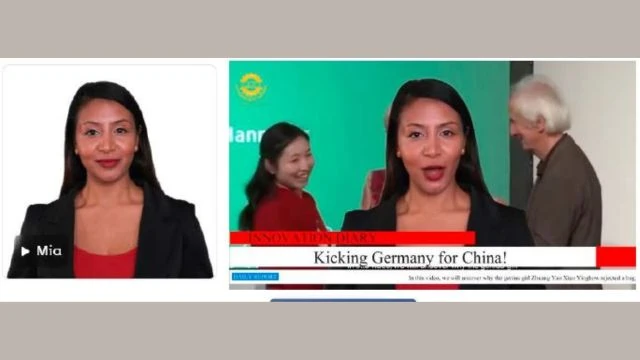There is a widespread YouTube story of a genius researcher who refused a high salary in Germany as she prefers to work in China. The pictures from the ASPI report proves that the researcher does not exist and is an avatar generated by the software of a specialized AI company.
It did not take a crystal ball to predict that artificial intelligence would soon be used to create fake characters with fake voices disseminating fake news. It is already happening, and on a massive scale.
Probably, there are other players in this game, but one has been caught red-handed, China. A very detailed report by the Australian Strategic Policy Institute (ASPI) has traced YouTube channels whose AI-generated videos have attracted so far 120 million views back to Chinese propaganda sources. Beijing’s routine answer to ASPI reports is that ASPI is a right-wing think-tank with anti-Communist prejudices. Personally, I have nothing against anti-Communism, but the CCP’s anti-ASPI propaganda is similar to those it disseminates against “Bitter Winter” or researchers such as Adrian Zenz. Rather than answering the content of the reports and articles, the strategy used is “shooting the messenger,” by claiming that those exposing the CCP’s crimes against humanity are (or were in their younger years) reactionary, right-wing, or Christian conservatives. One Marxist author the CCP should re-read is Antonio Gramsci. He famously wrote that by shooting the barometer your chances of eliminating the bad weather are slim.
I couldn’t care less whether the folks at the ASPI vote liberal or conservative or if they are Christians, Jews, or Buddhists. Their reports are usually well-documented. Each statement is supported by evidence. They are also cautious enough. In this case, they admit that there is no evidence proving that the Chinese “government” is behind the AI disinformation campaign. It is more probable that “patriotic” large Chinese “companies” are organizing it, although of course in China the border between public and private is thin.

What is important is that AI allows to take disinformation up to a new level, one making fake news more believable. It is also the case that, although ASPI has alerted YouTube to the problem, YouTube is notoriously reluctant to take down channels that spread political disinformation (it is much quicker to act when false claims of privacy or copyright protection are advanced to shut down voices criticizing totalitarian regimes or ideologies).
According to the ASPI report, AI-generated content goes beyond the classic propaganda hailing Xi Jinping or denying claims that the CCP regime infringes the human rights of ethnic and religious minorities and pretty much of everybody else. It is a new type of propaganda for its content as well as for its strategies.
ASPI has identified six main themes: “1. China and Russia are responsible, capable players in geopolitics and current world events. 2. China is winning the US–China tech war and overcoming US sanctions. 3. China is highly capable and trusted to build massive infrastructure projects. 4. China is winning the rare earths, critical minerals, and electric vehicles competition. 5. The US economy is weak, and the US dollar is no longer the world’s strongest currency. 6. The US is headed for collapse, and its alliance partnerships are fracturing.” There are also campaigns against U.S.-based companies such as Apple (which ironically manufactures a sizeable part of its products in China), promoting Chinese competitors such as Huawei or Xiaomi.

A fallacy sociologists call “technological determinism” would blame artificial intelligence, as in the past radio, television, and social media were blamed for the spread of pro-totalitarian-regimes disinformation. These are just tools, which can be used for good as well as for nefarious purposes. ASPI had persuasively documented that somebody in China is misusing YouTube for a mammoth disinformation campaign based on avatars and voices created by artificial intelligence. To be contrasted, this campaign should be first understood.

